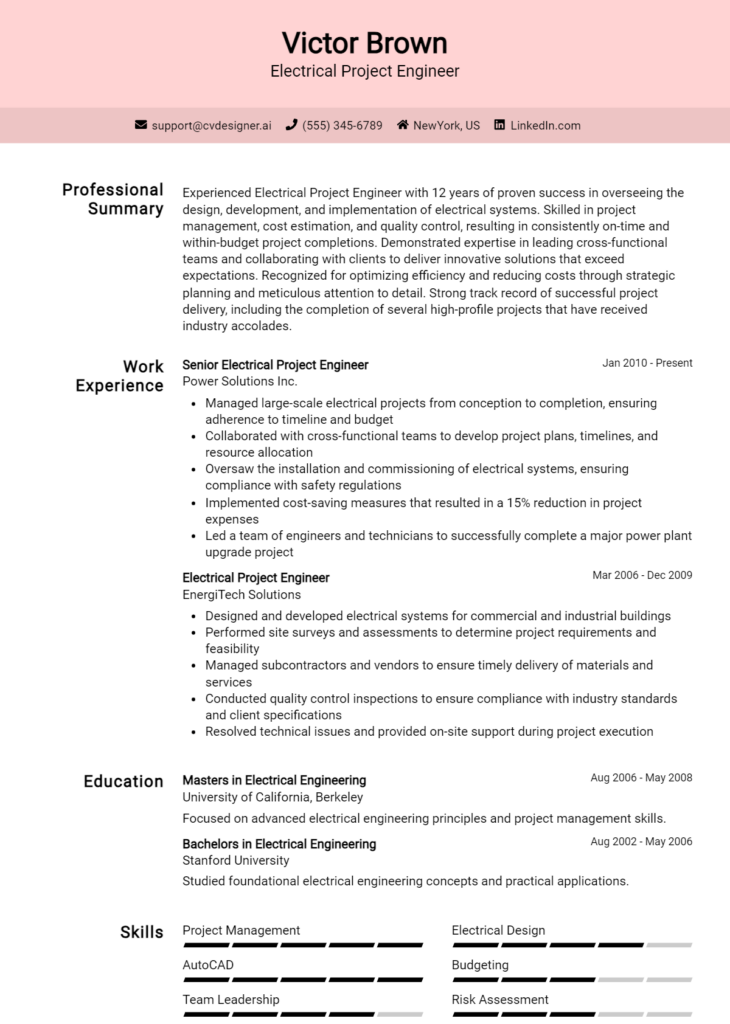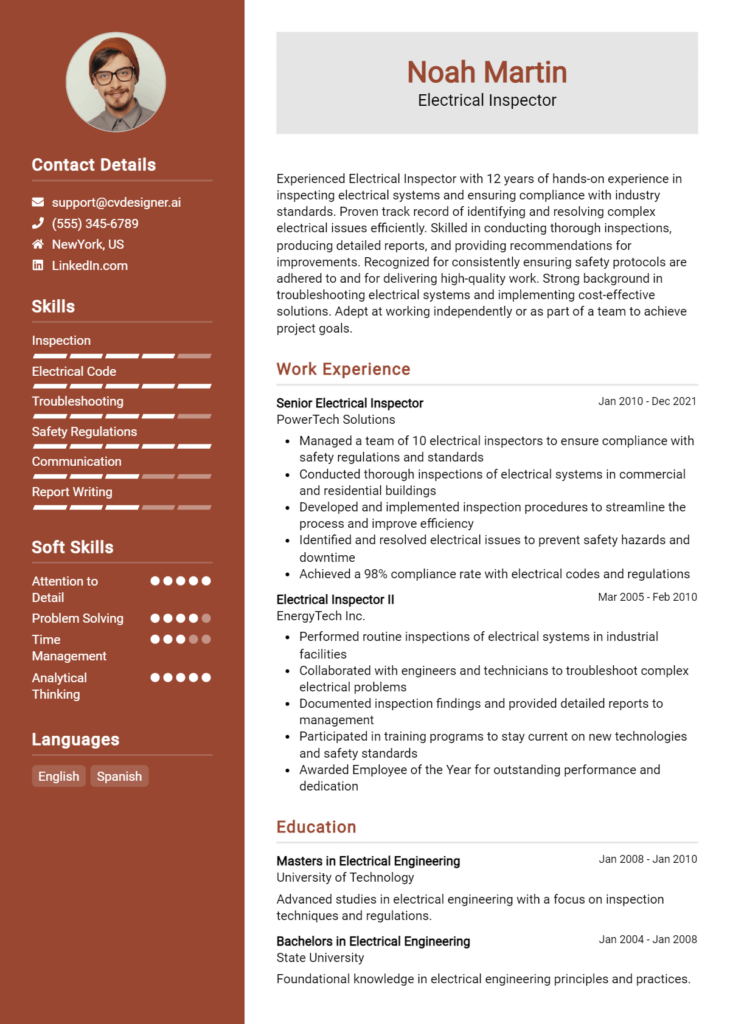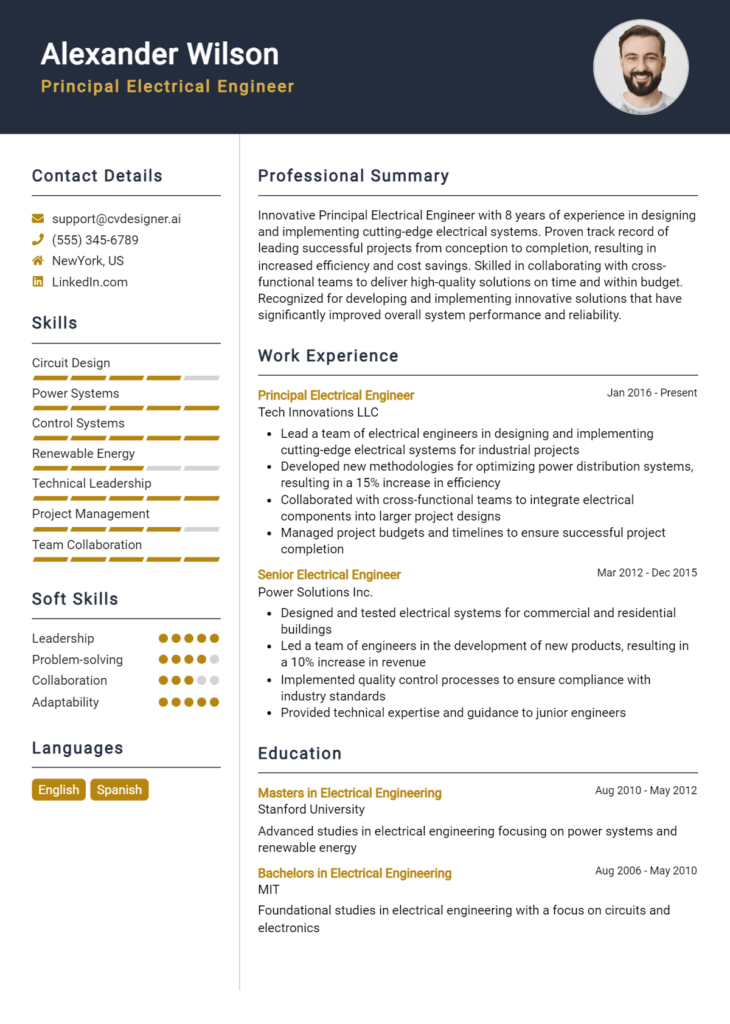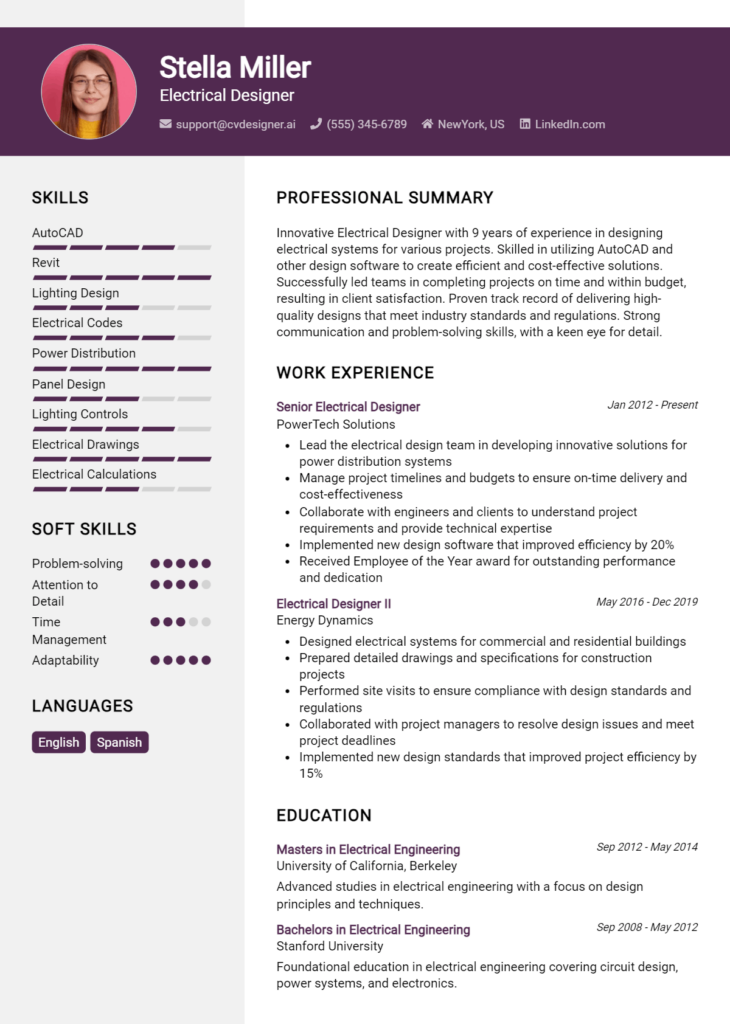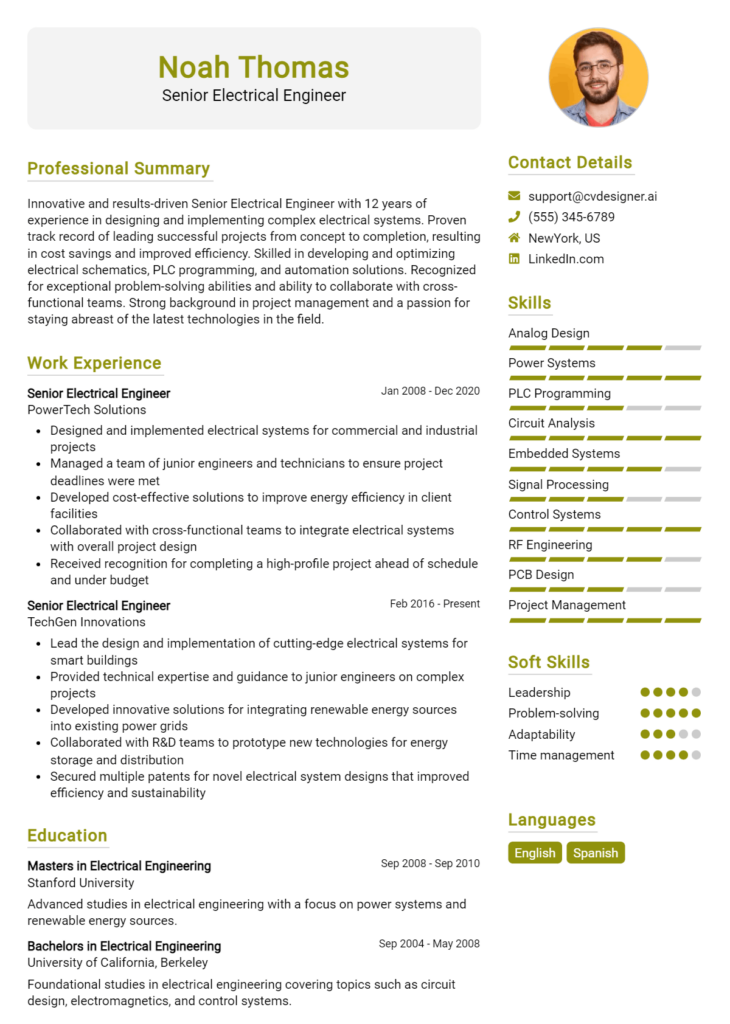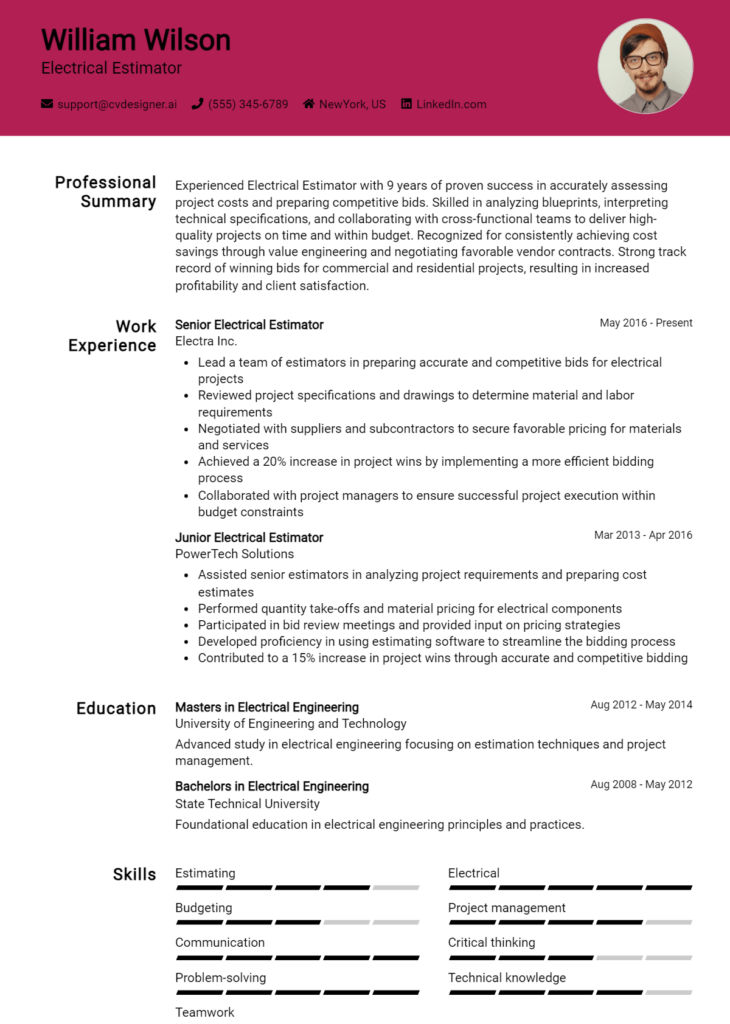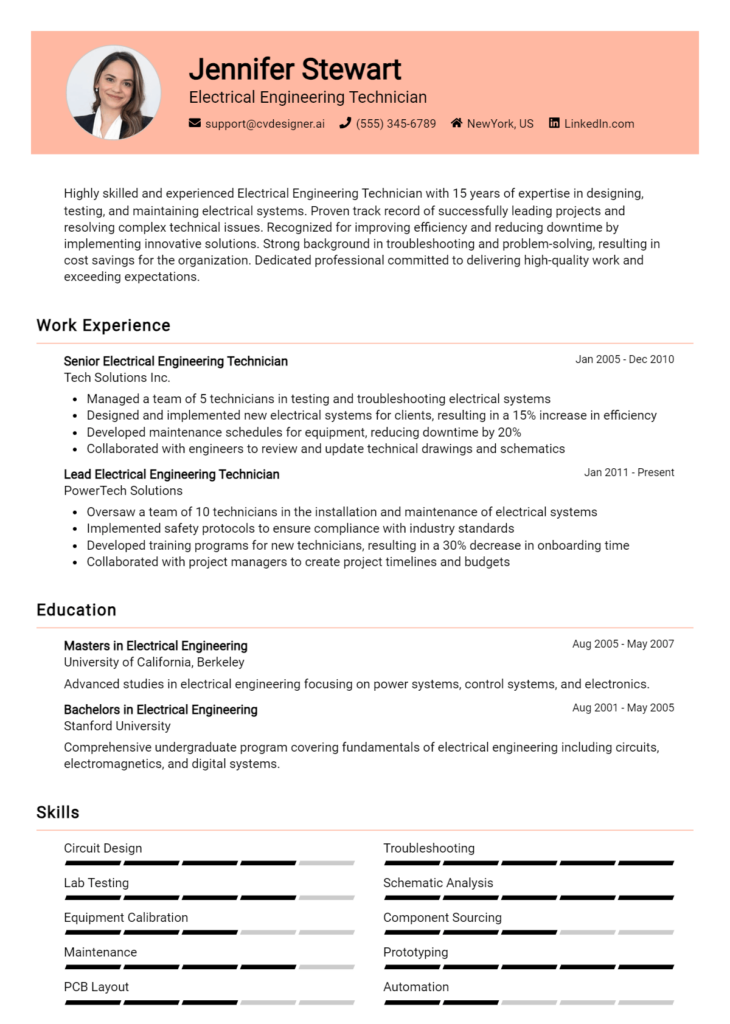Most Popular Electrical Engineer Resume Examples
Explore additional Electrical Engineer resume samples and guides and see what works for your level of experience or role.
As an Electrical Engineer, you play a crucial role in shaping the technological landscape of our world. From designing sophisticated electrical systems to developing innovative solutions for energy consumption, your expertise is vital in various industries, including telecommunications, manufacturing, and renewable energy. Given the competitive nature of the job market, having a well-crafted resume is essential in standing out to potential employers. A polished resume not only highlights your technical skills and experiences but also communicates your passion and suitability for the role, making it a powerful tool in your job search arsenal.
In this comprehensive Electrical Engineer resume writing guide, we will delve into the key elements that make a resume effective. You'll discover the core responsibilities and skills that should be highlighted, the best formats to employ for maximum impact, and common mistakes to avoid that could hinder your chances of landing an interview. We will provide you with tailored resume examples suitable for all experience levels, from entry-level positions to seasoned professionals. Additionally, we'll share invaluable tips on crafting your resume and selecting the right templates to present your qualifications in the best light. Whether you are just starting your career or looking to advance, this guide will equip you with the tools and insights needed to create a standout resume.
Key Responsibilities and Skills for a Electrical Engineer
Electrical Engineers play a crucial role in designing, developing, and maintaining electrical systems and components. Their responsibilities encompass a wide range of tasks, from conceptualizing new electrical devices to troubleshooting existing systems. Here are some key responsibilities typically associated with the role of an Electrical Engineer:
- Designing electrical systems and circuits to meet specific project requirements.
- Conducting feasibility studies and assessments to evaluate potential projects.
- Collaborating with multidisciplinary teams to ensure integrated system performance.
- Overseeing the installation, testing, and maintenance of electrical equipment.
- Ensuring compliance with industry standards and safety regulations.
- Creating detailed technical documentation, including specifications and reports.
- Utilizing software tools for simulation and modeling of electrical systems.
- Identifying and resolving technical issues during the development and implementation phases.
To excel in this role, an Electrical Engineer should possess a variety of essential skills:
- Strong knowledge of electrical principles and concepts.
- Proficiency in design and simulation software (e.g., AutoCAD, MATLAB).
- Excellent problem-solving and analytical abilities.
- Effective communication skills for teamwork and client interactions.
- Attention to detail and strong organizational skills.
- Understanding of safety protocols and regulatory compliance.
- Ability to manage projects and meet deadlines.
Highlighting these skills effectively in the resume skills section is crucial for making a strong impression on potential employers. Tailoring your responsibilities and skills to align with the specific job description not only demonstrates your suitability for the role but also shows that you understand the employer's needs.
Consider how these skills can be relevant in creating a strong CV as well. By emphasizing your technical expertise and relevant experiences, you can present a compelling case for why you are the ideal candidate for the Electrical Engineer position.
Best Resume Format and Structure for a Electrical Engineer
When crafting a resume for an Electrical Engineer position, it's crucial to choose a format that effectively showcases your skills, experience, and qualifications. Below is a detailed guide to help you structure your resume, along with tips on what to include in each section.
Contact Information
- Include your name prominently at the top of the resume.
- Add your phone number and a professional email address.
- Include your LinkedIn profile or a personal website if applicable, ensuring they are up-to-date.
- Optional: You can also include your address (city and state) but consider privacy and relevance.
Professional Summary
- Write a concise summary (2-3 sentences) that highlights your experience, key skills, and career objectives.
- Tailor this section to emphasize your expertise in electrical engineering, any significant projects, and your passion for the field.
- Use keywords relevant to the job description to catch the attention of hiring managers and Applicant Tracking Systems (ATS).
Work Experience
- List your work experience in reverse chronological order. Start with your most recent job and work backward.
- For each position, include:
- Job Title
- Company Name and location (city, state)
- Dates of Employment (month and year)
- Bullet points describing your responsibilities and achievements. Use action verbs and quantify results where possible (e.g., "Designed a circuit that improved efficiency by 15%").
- Highlight any experience with specific tools, software, or methodologies relevant to electrical engineering.
Education
- List your highest degree first. Include:
- Degree Title (e.g., Bachelor of Science in Electrical Engineering)
- University Name and location (city, state)
- Graduation Date (month and year)
- If you have relevant coursework, honors, or projects, consider adding them to showcase your knowledge and capabilities.
Skills
- Create a bullet-point list of your technical and soft skills. Focus on those relevant to the electrical engineering field, such as:
- Circuit design
- Control systems
- Project management
- Proficiency in software (e.g., MATLAB, AutoCAD, PSpice)
- Communication and teamwork
- Tailor this section based on the job description to make your resume more compelling.
Certifications
- List any relevant certifications, such as:
- Professional Engineer (PE) license
- Certified Automation Professional (CAP)
- Project Management Professional (PMP)
- Include the certifying body and the date obtained, if applicable.
Additional Tips
- Choose the Right Format: A reverse chronological format is typically best for electrical engineers, as it highlights your most recent and relevant experience. However, if you have diverse experience or are changing careers, a functional or combination format could be more beneficial.
- Keep It Concise: Aim for one page, especially if you have less than 10 years of experience. Use clear headings and plenty of white space for readability.
- Tailor Each Resume: Customize your resume for each job application by adjusting the professional summary and emphasizing relevant experiences and skills.
Cover Letter Complement
The format of your resume should complement your cover letter. Both documents should share consistent fonts, sizes, and styles to reflect professionalism. While the resume focuses on your qualifications, the cover letter can provide context for your career story and highlight your motivation for applying. Ensure both documents are tailored to the specific job, reinforcing your suitability for the position.
Writing Tips and Best Practices for a Electrical Engineer Resume
Crafting a compelling resume as an Electrical Engineer requires a strategic approach that highlights your technical skills, relevant experience, and achievements in a clear and professional manner. Start by focusing on your most relevant experiences and skills, tailoring your resume to the specific job description. Remember to utilize resume writing tips to ensure your document looks polished and stands out to potential employers. Additionally, consider how these best practices can enhance your cover letter by providing a cohesive representation of your qualifications.
- Use strong action verbs such as "designed," "developed," "implemented," and "analyzed" to convey your contributions effectively.
- Quantify your achievements whenever possible; for example, mention how much you improved efficiency or reduced costs in past projects.
- Incorporate industry-specific keywords from the job posting to pass through Applicant Tracking Systems (ATS) and demonstrate your familiarity with the field.
- Organize your resume with clear headings and bullet points to improve readability and make it easier for hiring managers to scan your qualifications.
- Highlight relevant certifications, licenses, and software proficiencies that are pertinent to electrical engineering roles.
- Tailor your professional summary to reflect your career goals and the specific skills that align with the job you're applying for.
- Keep your resume to one or two pages, ensuring it is concise while including all necessary information.
- Proofread your resume multiple times to eliminate any grammatical errors or typos that could detract from your professionalism.
Common Mistakes to Avoid in a Electrical Engineer Resume
When crafting a resume for an Electrical Engineer position, it's essential to present your skills and experiences clearly and effectively. However, many candidates fall into common traps that can undermine their chances of landing an interview. Avoiding these pitfalls can significantly enhance the impact of your resume. Here are some common mistakes to steer clear of:
- Overloading the resume with excessive information, making it difficult to read.
- Using generic descriptions that fail to highlight specific skills and accomplishments.
- Failing to tailor the resume for the specific job or industry.
- Neglecting to quantify achievements, such as including metrics or specific results.
- Using jargon or overly technical language that may confuse non-technical recruiters.
- Ignoring formatting consistency, which can make the document appear unprofessional.
- Including irrelevant work experience that doesn’t relate to the electrical engineering field.
- Forgetting to proofread for typos and grammatical errors, which can undermine professionalism.
- Not including essential contact information or using an unprofessional email address.
- Failing to include keywords from the job description, which can hinder passing applicant tracking systems.
To ensure your resume stands out for the right reasons, consider reviewing the common mistakes to avoid in a resume. Additionally, don't overlook the importance of a strong cover letter; you can find tips on avoiding common cover letter mistakes as well.
Sample Electrical Engineer Resumes
When applying for a job as an Electrical Engineer, a well-crafted resume is essential to showcase your skills, experience, and qualifications. Below are three sample resumes tailored for different stages of an engineering career: one for an experienced professional, one for an entry-level candidate, and one for a career changer. Each example highlights relevant skills and achievements to help you stand out in the competitive job market.
Experienced Electrical Engineer
John Doe
123 Engineering Lane
City, State, ZIP
(123) 456-7890
john.doe@email.com
Professional Summary
Results-driven Electrical Engineer with over 8 years of experience in designing, developing, and implementing electrical systems and components for various industries. Proven track record in project management, team leadership, and delivering high-quality solutions that meet client requirements and industry standards.
Experience
Senior Electrical Engineer
ABC Technologies, City, State
June 2018 – Present
- Lead a team of engineers in the design and development of innovative electrical systems for commercial and industrial projects.
- Successfully managed multiple projects from conception to completion, ensuring adherence to budget and timelines.
- Collaborated with cross-functional teams to identify and resolve technical challenges, resulting in a 15% increase in project efficiency.
Electrical Engineer
XYZ Enterprises, City, State
May 2015 – June 2018
- Designed and tested electrical circuits and systems for consumer electronics, improving overall product performance by 20%.
- Conducted feasibility studies and cost analyses, contributing to the successful launch of four new products.
- Developed technical documentation and specifications for engineering projects, enhancing communication within teams.
Education
Bachelor of Science in Electrical Engineering
University of Engineering, City, State
Graduated: May 2015
Skills
- Circuit Design & Analysis
- Project Management
- Team Leadership
- AutoCAD & MATLAB
- Problem Solving
Entry-Level Electrical Engineer
Jane Smith
456 Tech Way
City, State, ZIP
(987) 654-3210
jane.smith@email.com
Professional Summary
Motivated recent Electrical Engineering graduate with a strong foundation in circuit design, control systems, and renewable energy technologies. Eager to apply academic knowledge and internship experience in a dynamic engineering role to contribute to innovative projects.
Experience
Electrical Engineering Intern
Tech Solutions Inc., City, State
June 2022 – August 2023
- Assisted senior engineers in the design and testing of electrical systems for renewable energy projects.
- Conducted simulations using MATLAB, helping to optimize system performance and efficiency.
- Developed and maintained project documentation, ensuring compliance with industry standards.
Project Work
- Designed a solar-powered charging station as part of a senior design project, which was presented at the university engineering fair.
- Collaborated with a team to create a prototype for an automated irrigation system, focusing on energy efficiency.
Education
Bachelor of Science in Electrical Engineering
University of Technology, City, State
Graduated: May 2023
Skills
- Circuit Design
- MATLAB & Simulink
- Renewable Energy Systems
- Technical Communication
- Team Collaboration
Career Changer to Electrical Engineer
Michael Brown
789 Innovation St.
City, State, ZIP
(321) 654-0987
michael.brown@email.com
Professional Summary
Detail-oriented professional with a background in mechanical engineering and project management, transitioning to Electrical Engineering. Strong analytical skills and a passion for electrical systems design, complemented by hands-on experience in technical roles. Committed to leveraging diverse skill sets to contribute to innovative engineering solutions.
Experience
Mechanical Engineer
Global Manufacturing Corp., City, State
January 2018 – Present
- Managed projects focused on mechanical systems, collaborating with electrical teams to integrate systems effectively.
- Conducted root cause analysis on system failures, enhancing troubleshooting skills and knowledge of electrical components.
- Developed training materials and conducted workshops on system integration for new engineers.
Technical Support Technician
Tech Services Ltd., City, State
June 2015 – December 2017
- Provided technical support for electrical equipment, diagnosing issues and implementing solutions to improve functionality.
- Assisted in the installation and maintenance of electrical systems in commercial settings.
Education
Bachelor of Science in Mechanical Engineering
Technology University, City, State
Graduated: May 2017
Additional Coursework
- Electrical Circuit Theory
- Digital Design and Electronics
Skills
- Systems Integration
- Technical Support
- Project Management
- Problem Solving
- Proficient in CAD Software
For more inspiration and to explore a variety of resume templates, feel free to check out our resources. Additionally, crafting a compelling cover letter is crucial for a complete job application package; you can find corresponding cover letter examples to help you get started.
Checklist for a Electrical Engineer Resume
- Proofread for Errors: Carefully read through your resume multiple times to catch any spelling or grammatical errors. Consider using tools like Grammarly for assistance.
- Check Consistency: Ensure font styles, sizes, and formatting (bullet points, headings, etc.) are consistent throughout the document. This gives a polished and professional look.
- Tailor Your Resume: Customize your resume for each job application by emphasizing the skills and experiences that align with the job description. Highlight relevant projects or technologies you've worked with.
- Highlight Technical Skills: Clearly list your technical skills, including software proficiency (like AutoCAD, MATLAB) and specific electrical engineering competencies (like circuit design, power systems).
- Quantify Achievements: Whenever possible, use numbers to describe your accomplishments (e.g., “Increased system efficiency by 20%” or “Managed a team of 5 engineers”).
- Use Action Verbs: Start bullet points with strong action verbs (e.g., designed, developed, implemented) to convey your responsibilities and achievements effectively.
- Include Certifications: List any relevant certifications (e.g., PE license, PMP certification) prominently to demonstrate your qualifications and ongoing professional development.
- Limit Length: Aim for a concise resume, ideally one page for entry-level positions and up to two pages for experienced engineers. Keep information relevant and impactful.
- Get Feedback: Have a mentor or colleague review your resume to provide constructive feedback and suggestions for improvement.
- Utilize AI Tools: Consider using an AI resume builder to ensure that all elements are well-organized and visually appealing.
A similar checklist can also be followed when creating a CV or cover letter.
Key Takeaways for a Electrical Engineer Resume Guide
As you embark on your journey to create a standout resume as an Electrical Engineer, remember that the examples and tips provided in this guide are here to help you showcase your skills and achievements effectively. Focus on highlighting relevant experiences, technical competencies, and projects that align with your career goals. To take the next step, consider downloading a professional resume template from resume templates, or explore our tailored cover letter templates to complement your application. For a more personalized approach, try our user-friendly resume maker to craft a document that truly reflects your expertise. Additionally, adhering to the guidelines in this guide will also prove beneficial in developing a compelling CV and a persuasive cover letter. Start building your professional narrative today!

